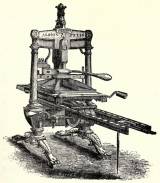This series highlights aspects of my experience self-publishing The Alexandria Project. If you'd like to read the book this series is based on, you can read the first three chapters for free here.
 Last week I identified the different types of Print on Demand (POD) publishers that are active in the market today and provided tips on how to decide which type would best meet your needs. Before we go on to talk about how to select a specific publisher, it's worth pausing to look more deeply into what each type of POD publisher actually does, and how it makes its money.
Last week I identified the different types of Print on Demand (POD) publishers that are active in the market today and provided tips on how to decide which type would best meet your needs. Before we go on to talk about how to select a specific publisher, it's worth pausing to look more deeply into what each type of POD publisher actually does, and how it makes its money.
Why? Because knowing what a POD publisher wants to get out of your partnership makes it easier for you to pick one where your interests and theirs will most closely align. That's what you want, because if the POD publisher wins, then you will as well.
Welcome to the sequel to The Alexandria Project, a cybersecurity thriller. If you'd like to read the book this series is based on, you can read the first three chapters for free here.
 It was early afternoon when Frank and Josette rolled slowly into Gerlach, following a 1960’s era VW minibus. Behind them was something that resembled a cross between a Viking long ship and a Mississippi river boat. (“Ah! An Art Car!” Josette exclaimed.)
It was early afternoon when Frank and Josette rolled slowly into Gerlach, following a 1960’s era VW minibus. Behind them was something that resembled a cross between a Viking long ship and a Mississippi river boat. (“Ah! An Art Car!” Josette exclaimed.)
They hadn’t expected to find much in Gerlach, since Josette had already looked the hamlet up on the Internet. A typical description read:
Welcome to Gerlach, Nevada (pop. 450). In this thriving metropolis you will find one elementary school, one high school, one post office, one propane distributor, one gas station, one motel, 3 bars and that's it.
This series highlights aspects of my experience self-publishing The Alexandria Project. If you'd like to read the book this series is based on, you can read the first three chapters for free here.
Like just about every other step in self-publishing a book, researching and selecting a print on demand (POD) publisher can be a time-consuming and even bewildering experience. The problem arises not from a lack of choices, but just the opposite. Today, there are scores of publishers to choose from, with significant differences among them in business model, cost, speed, quality and reputation. The challenge is therefore to figure out which one is just right you.
The first step in that process is to understand the high-level differences between the alternatives available. At the highest level of categorization, there are currently three models from which to choose:
Welcome to the sequel to The Alexandria Project, a cybersecurity thriller. If you'd like to read the book this series is based on, you can read the first three chapters for free here
 The sun was once again shining the next morning as Frank drove west on Route 50. The harsh glare made it as hard to see as he was finding it difficult to think. Just the day before, he had been sitting in his clearing swearing at his laptop, and now he was off on what could prove to be two wild goose chases – the first, to find someone a government agency that didn’t exist was convinced was hacking into the pollsters’ computer systems, and the second to chauffeur a young French woman to a countercultural festival for reasons he was trying hard to pretend he did not understand.
The sun was once again shining the next morning as Frank drove west on Route 50. The harsh glare made it as hard to see as he was finding it difficult to think. Just the day before, he had been sitting in his clearing swearing at his laptop, and now he was off on what could prove to be two wild goose chases – the first, to find someone a government agency that didn’t exist was convinced was hacking into the pollsters’ computer systems, and the second to chauffeur a young French woman to a countercultural festival for reasons he was trying hard to pretend he did not understand.
This series highlights aspects of my experience self-publishing The Alexandria Project. If you'd like to read the book this series is based on, you can read the first three chapters for free here.
 If you are of a certain age (and I, most regrettably, am definitely of a certain age), a book means a certain thing, and that is this: something that you can hold in your hands, keep on a shelf, pack up and carry in a box in move after move (after move, after move…), and generally treasure for life, if it’s a good read or a valued resource. Kept indoors and absent a natural disaster, it can – and does – live on for centuries, always there, patiently waiting to be discovered anew, generation after generation.
If you are of a certain age (and I, most regrettably, am definitely of a certain age), a book means a certain thing, and that is this: something that you can hold in your hands, keep on a shelf, pack up and carry in a box in move after move (after move, after move…), and generally treasure for life, if it’s a good read or a valued resource. Kept indoors and absent a natural disaster, it can – and does – live on for centuries, always there, patiently waiting to be discovered anew, generation after generation.
It should therefore come as no surprise that the book I wrote last year, The Alexandria Project, will soon be available in tangible as well as eBook form. This is not to say that this makes a terrific amount of sense, viewed from any rational economic point of view. After all, it’s not likely that any bookstore will ever stock it. Moreover, because of costs of production, it’s also not likely that many people will buy it in soft cover, as compared to electronic form, let alone hardcover.
Welcome to the sequel to The Alexandria Project, a cybersecurity thriller. If you'd like to read the book this series is based on, you can read the first three chapters for free here.
 It was only an hour after the helicopter’s departure, but Frank was on the move, driving carefully down the jeep track through the wind-whipped, driving rain, periodically blinded by vivid flashes of lightning. This wasn’t the usual afternoon thunderstorm, where few raindrops survived the long descent through dry desert air without evaporating before reaching the ground. This was the product of a full monsoon front sweeping up from the Gulf, the kind the ranchers relied on to refill their stockponds and green up the grass again for their cattle.
It was only an hour after the helicopter’s departure, but Frank was on the move, driving carefully down the jeep track through the wind-whipped, driving rain, periodically blinded by vivid flashes of lightning. This wasn’t the usual afternoon thunderstorm, where few raindrops survived the long descent through dry desert air without evaporating before reaching the ground. This was the product of a full monsoon front sweeping up from the Gulf, the kind the ranchers relied on to refill their stockponds and green up the grass again for their cattle.
Now that he had signed on with whoever it was that he would be reporting to, Frank was anxious to get started, and he wanted a change of scenery to go along with the new objective. It hadn’t taken long to pack up. But by then the storm was breaking over him.
Welcome to the sequel to The Alexandria Project, a cybersecurity thriller. If you'd like to read the book this series is based on, you can read the first three chapters for free here.
 A wide, Nevada valley stretched before Frank Adversego - stretched as far as he could see. Something about this particular vista, though, pricked at his memory. Something about the way the mountains converged in the hazy perspective of the distance.
A wide, Nevada valley stretched before Frank Adversego - stretched as far as he could see. Something about this particular vista, though, pricked at his memory. Something about the way the mountains converged in the hazy perspective of the distance.
Ah - that was it. This was the road he’d traveled in ghostly moonlight a year ago, wrestling with various demons, both past and present. Happily, they had now all been laid to rest. And who knew what might lie ahead?
 Since 2005, I see that I have written over 227 blog entries about ODF (I say more than, because the very earliest got lost in an earlier platform migration). Throughout the greatest part of this six year period, OpenOffice was the poster child ODF implementation - the one with the most users, the most press attention, the most corporate support - tens of millions of dollars of it, from Sun Microsystems. Of course, there were other impressive implementations, both open source and proprietary alike. OpenOffice, though, was always the default ODF implementation referenced by the press.
Since 2005, I see that I have written over 227 blog entries about ODF (I say more than, because the very earliest got lost in an earlier platform migration). Throughout the greatest part of this six year period, OpenOffice was the poster child ODF implementation - the one with the most users, the most press attention, the most corporate support - tens of millions of dollars of it, from Sun Microsystems. Of course, there were other impressive implementations, both open source and proprietary alike. OpenOffice, though, was always the default ODF implementation referenced by the press.
 It's impossible for anyone who has witnessed the personal computer and personal technology age from its beginning to separate Steve Jobs from that incredible odyssey. From the start, he envisioned, created, and defined new platforms and categories of media experience.
It's impossible for anyone who has witnessed the personal computer and personal technology age from its beginning to separate Steve Jobs from that incredible odyssey. From the start, he envisioned, created, and defined new platforms and categories of media experience.
Sometimes he was not the first to invent, as with the mouse, the MP3 Player, the smartphone and the slate computer. But when he turned his exceptional perceptions, sense of style and insistence on perfection to each of these tools, he exposed the limited vision of those who had first introduced these tools by reenvisioning, recreating, and redefining what those tools could be.
Each time, his vision almost instantly prevailed.
 Anyone paying attention to technology news lately knows that the Titans are clashing for control, or at least a share of the monetary rewards, of the mobile marketplace. When technology historians look back on this era, they'll likely see this as a time when the tectonic plates suddenly shifted, wrenching apart corporate monopolies and rearranging the terrain upon which the next great age of technical innovation and adoption will play out. These sudden shifts have predictably sent tremors reverberating across the competitive landscape.
Anyone paying attention to technology news lately knows that the Titans are clashing for control, or at least a share of the monetary rewards, of the mobile marketplace. When technology historians look back on this era, they'll likely see this as a time when the tectonic plates suddenly shifted, wrenching apart corporate monopolies and rearranging the terrain upon which the next great age of technical innovation and adoption will play out. These sudden shifts have predictably sent tremors reverberating across the competitive landscape.
 Last week I identified the different types of Print on Demand (POD) publishers that are active in the market today and provided tips on how to decide which type would best meet your needs. Before we go on to talk about how to select a specific publisher, it's worth pausing to look more deeply into what each type of POD publisher actually does, and how it makes its money.
Last week I identified the different types of Print on Demand (POD) publishers that are active in the market today and provided tips on how to decide which type would best meet your needs. Before we go on to talk about how to select a specific publisher, it's worth pausing to look more deeply into what each type of POD publisher actually does, and how it makes its money.  It was early afternoon when Frank and Josette rolled slowly into Gerlach, following a 1960’s era VW minibus. Behind them was something that resembled a cross between a Viking long ship and a Mississippi river boat. (“Ah! An
It was early afternoon when Frank and Josette rolled slowly into Gerlach, following a 1960’s era VW minibus. Behind them was something that resembled a cross between a Viking long ship and a Mississippi river boat. (“Ah! An  The sun was once again shining the next morning as Frank drove west on Route 50. The harsh glare made it as hard to see as he was finding it difficult to think. Just the day before, he had been sitting in his clearing swearing at his laptop, and now he was off on what could prove to be two wild goose chases – the first, to find someone a government agency that didn’t exist was convinced was hacking into the pollsters’ computer systems, and the second to chauffeur a young French woman to a countercultural festival for reasons he was trying hard to pretend he did not understand.
The sun was once again shining the next morning as Frank drove west on Route 50. The harsh glare made it as hard to see as he was finding it difficult to think. Just the day before, he had been sitting in his clearing swearing at his laptop, and now he was off on what could prove to be two wild goose chases – the first, to find someone a government agency that didn’t exist was convinced was hacking into the pollsters’ computer systems, and the second to chauffeur a young French woman to a countercultural festival for reasons he was trying hard to pretend he did not understand. If you are of a certain age (and I, most regrettably, am definitely of a certain age), a book means a certain thing, and that is this: something that you can hold in your hands, keep on a shelf, pack up and carry in a box in move after move (after move, after move…), and generally treasure for life, if it’s a good read or a valued resource. Kept indoors and absent a natural disaster, it can – and does – live on for centuries, always there, patiently waiting to be discovered anew, generation after generation.
If you are of a certain age (and I, most regrettably, am definitely of a certain age), a book means a certain thing, and that is this: something that you can hold in your hands, keep on a shelf, pack up and carry in a box in move after move (after move, after move…), and generally treasure for life, if it’s a good read or a valued resource. Kept indoors and absent a natural disaster, it can – and does – live on for centuries, always there, patiently waiting to be discovered anew, generation after generation.


 It's impossible for anyone who has witnessed the personal computer and personal technology age from its beginning to separate Steve Jobs from that incredible odyssey. From the start, he envisioned, created, and defined new platforms and categories of media experience.
It's impossible for anyone who has witnessed the personal computer and personal technology age from its beginning to separate Steve Jobs from that incredible odyssey. From the start, he envisioned, created, and defined new platforms and categories of media experience.  Anyone paying attention to technology news lately knows that the Titans are clashing for control, or at least a share of the monetary rewards, of the mobile marketplace. When technology historians look back on this era, they'll likely see this as a time when the tectonic plates suddenly shifted, wrenching apart corporate monopolies and rearranging the terrain upon which the next great age of technical innovation and adoption will play out. These sudden shifts have predictably sent tremors reverberating across the competitive landscape.
Anyone paying attention to technology news lately knows that the Titans are clashing for control, or at least a share of the monetary rewards, of the mobile marketplace. When technology historians look back on this era, they'll likely see this as a time when the tectonic plates suddenly shifted, wrenching apart corporate monopolies and rearranging the terrain upon which the next great age of technical innovation and adoption will play out. These sudden shifts have predictably sent tremors reverberating across the competitive landscape.